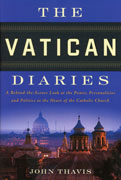We're undergoing a website migration. Please pardon any intermittent outages.
Ripples spread out from Hans Küng's work
Viewpoint: In a style that is simple, direct and trenchant Küng through his writing has ventured fearlessly into places that other theologians do not reach.
A quest for the real Benedict
 THE VATICAN DIARIES: A BEHIND-THE-SCENES LOOK AT THE POWER, PERSONALITIES AND POLITICS AT THE HEART OF THE CATHOLIC CHURCH
THE VATICAN DIARIES: A BEHIND-THE-SCENES LOOK AT THE POWER, PERSONALITIES AND POLITICS AT THE HEART OF THE CATHOLIC CHURCH
By John Thavis
Published by Viking, $15.98
Jesuit: Liberation theology will endure and grow
MUNICH, GERMANY -- There is a general view in the church today that liberation theology, which shone so brightly for a while after the Second Vatican Council (1962-65), is dead. The declaration against it issued by the Vatican Congregation for the Doctrine of the Faith in 1984, it is thought, killed it off. But the reality is different. Certainly this movement as a force around which to organize in favor of the poor is less prominent today. But its inspiration is still very much alive.
Such is the message of this interview given recently in Munich by the rector of the Jesuit community there, Fr. Martin Maier, former editor in chief of the celebrated monthly magazine Stimmen der Zeit.
With a thousand Anglican converts, ordinariate gets going
ANALYSIS
Not for nothing has the Congregation for the Doctrine of the Faith in Rome been known as the “Suprema.” It does not specialize in consultation with other bodies, whether within the Vatican or elsewhere. This mindset was spectacularly exhibited with the abrupt unveiling of a new supra-territorial Roman Catholic church structure titled a “Personal Ordinariate,” with its doors open to groups of disaffected Anglicans throughout the world who were invited to move collectively to Rome, bringing their Anglican patrimony with them. This explosive device had been secretly laid below the surface of Anglican-Roman Catholic relations by a small party of doctrinal congregation sappers, encouraged by Pope Benedict XVI. In press conferences on Oct. 20, 2009, it was detonated.
The 'straight arrow' theologian and the pope
Unity wins out over diversity
Hope among thorns
Advertisement
Advertisement
Advertisement
Advertisement
Advertisement
Advertisement
Advertisement
Advertisement
